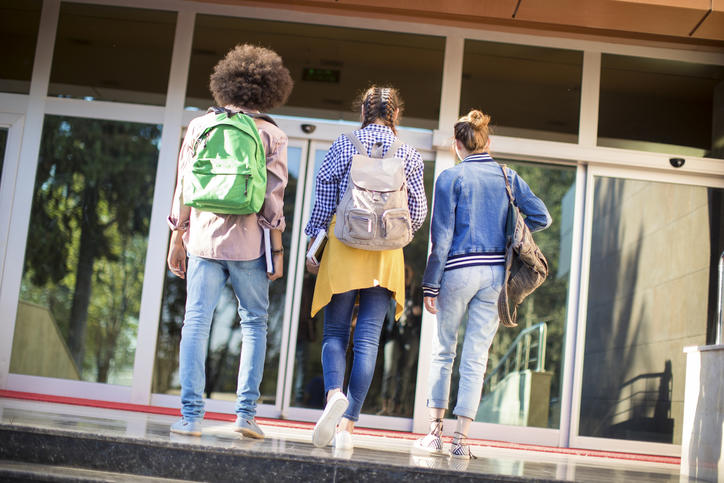
The guide for the start of academic year 2021
The French ministry in charge of higher education has published a “guide for the start of academic year” (guide de la rentrée étudiante in French) explaining the French government’s investments (3.3 billion euros) to improve the social follow-up of students.
"Un investissement sans précédent au service de l'accompagnement social des étudiants". C’est en ces termes que le ministère présente son guide qui "confirme son engagement fort en faveur de la vie étudiante". Point par point, ce nouveau guide de rentrée pour l'année 2021 détaille les avancées, prévues cette année, en matière d’amélioration des conditions de vie étudiante : le gel des droits d'inscription, les actions pour les étudiants en situation de handicap, les emplois étudiants, les aides exceptionnelles, les dispositifs pour trouver un logement, la restauration universitaire à tarification sociale, l’amélioration de la vie étudiante, la création d’équipes mobiles de vaccination etc.
10 000 euros par an dépensés par l’Etat pour un étudiant
En France, c’est l’État qui prend en charge le reste du coût réel de la scolarité des étudiants, en dehors des frais qui reviennent à l’étudiant lui-même. Le ministère précise en effet que la dépense moyenne de l’État pour la scolarité des étudiants s’élève à près de 10 000 euros par an, tous cycles confondus, à l’université.
Face à la crise sanitaire, le Gouvernement a décidé "de geler les droits d’inscription à l’université et de les maintenir au niveau de la rentrée précédente", pour la deuxième année consécutive.
Des aides exceptionnelles pour répondre à la crise sanitaire
Cette année, de nombreuses mesures s’adaptent à la crise sanitaire pour en atténuer les effets. Dès la fin de l’année 2020, la ministre de l’enseignement supérieur a annoncé "un fort accroissement du fonds des aides d’urgences des CROUS par rapport à la dotation d’avant-crise, à destination de tous les étudiants, boursiers ou non-boursiers".
Cette annonce s’est accompagnée de mesures de simplification pour obtenir ces aides exceptionnelles. A ce titre, un numéro d’appel national pour les étudiants rencontrant des difficultés financières graves a été mis en place. Ce numéro d’appel (0 806 000 278) a pour objectif de favoriser le recours aux aides financières d’urgence qui existent déjà mais qui, selon le guide de rentrée "restent encore trop peu connues et utilisées".
Des initiatives pour permettre un meilleur accès au logement
La question du logement reste une question sensible pour beaucoup d'étudiants. Les services du ministère ont ainsi répertorié dans le "Guide de la rentrée étudiante " les solutions existantes pour faciliter l’accès au logement.
Le Gouvernement, souligne le texte, a "déployé un programme ambitieux de réhabilitation et de construction de nouveaux logements étudiants". Dans le même temps, en dehors des logements offerts par les CROUS, "de nombreux dispositifs ont également été mis en place pour aider les étudiants dans leur recherche de logement dans le parc privé", comme par exemple :
-
Le dispositif Visale, système de cautionnement locatif ouvert aux étudiants, y compris aux étudiants internationaux, et qui permet de bénéficier gratuitement d'une caution locative pour tout type de logement ;
-
La plateforme Lokaviz, la centrale du logement étudiant non commerciale qui permet de faire gratuitement une recherche et de consulter les annonces.
Une restauration universitaire adaptée aux besoins des étudiants
Toujours selon le "Guide de la rentrée étudiante", la restauration a évolué pour "répondre aux nouveaux modes de consommation des étudiants en proposant une restauration de qualité à consommer sur place ou à l’extérieur". Actuellement, grâce aux 750 points de restauration implantés dans les villes universitaires, 2,3 millions d’étudiants (sur 2,8 millions) "peuvent avoir accès à un site de restauration dans leur environnement immédiat".
En outre, "l’ensemble des étudiants boursiers sur critères sociaux, et les étudiants non boursiers attestant de difficultés financières graves constatées par les services sociaux des CROUS continueront à bénéficier d’un repas complet dans les restaurants universitaires pour 1 euro", un système mis en place au plus fort de la crise sanitaire. Les autres étudiants bénéficieront d’un repas au tarif social de 3,30 €.
Un effort pour les étudiants en situation de handicap
Près de 7,5 millions d’euros sont dédiés chaque année à des mesures qui ont pour but de mieux aider les étudiants en situation de handicap dans leurs études. Le ministère précise que toutes les universités sont aujourd’hui "dotées d’une structure handicap dédiée à l’accueil et l’accompagnement des étudiants en situation de handicap tout au long de leur parcours universitaire".
Parmi les avancées notables cette année : de nouvelles mesures d’accessibilité prévues pour chaque établissement (aides à la prise de notes, possibilité d’aménagements de l’emploi du temps et des examens) et l’augmentation du nombre de contrats doctoraux réservés aux étudiants en situation de handicap.
La vaccination pour une la reprise en 100% présentiel
D’après les données de Santé publique France, reprises dans ce Guide, 77% des 18/24 ans ont reçu au moins une première dose de vaccin (au 15 août 2021). Il n’en reste pas moins que, selon le ministère, "pour lutter efficacement contre la Covid-19 et permettre une reprise à 100% en présentiel, la vaccination est la clé".
Pour y parvenir, plusieurs types d’actions sont prévues, telles que :
-
Le déploiement de « barnums de vaccination » sur les campus, au cours des premières semaines de rentrée, afin de permettre aux étudiants qui le souhaitent de se faire vacciner ;
-
Des tests et des autotests qui continueront à être mis à disposition, notamment dans les Centres de santé universitaire, pour faciliter le dépistage et la prévention.
Related contents
Recommended News




















































